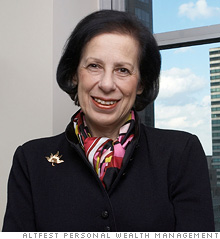Search News
NEW YORK (CNNMoney) -- First you lose your spouse in the most devastating terrorist attack in U.S. history. Then you get a lottery-sized payout from the U.S. government.
That's the head-spinning situation that beset more than 5,000 people in the wake of the September 11 attacks that took 2,753 lives.
 |
| Certified financial planner Karen Altfest volunteered to help Sept. 11 widows plan their financial futures. |
So while volunteers mobilized to help at Ground Zero, another sort of rescue squad -- certified financial planners -- offered to help the victims' families manage this influx of wealth, free of charge. (The 9/11 fund: Putting a price on life)
Careful financial planning is difficult in the best of times, but in the midst of a tragedy it's nearly impossible. Survivors had a wide range of reactions, according to financial adviser Karen Altfest, who worked with widows and other people who lost family in the al Qaeda attacks.
"Some did not want to accept the money," she said. "Others can't stop spending the money."
The September 11th Victim Compensation Fund dispensed a total of $7 billion to families who had lost loved ones in the attacks. Grief-stricken spouses were awarded an average of $2,083,000.
While $2 million is a lot of money, Altfest was quick to point out that it "isn't so much if it's supposed to last a family 50 years or so."
Many of these new-found millionaires were ill-prepared to manage these payouts so that they'd last a lifetime for their families. That's where the CFAs came in.
"These are, for the most part, sums they have never seen before, that they've never envisioned, on top of the fact that they've been traumatized," said Gary Schatsky, a CFA who has volunteered his services for September 11 families. "So they're not always clear on how they're viewing their spending."
Schatsky said that some of the spouses who lost loved ones to the attacks would "spend at a reckless rate" with the intention of improving the lives of their traumatized children, buying them presents and taking lots of vacations.
"We know one family that takes more vacations in a year than many of our other clients take in three or four years," said Altfest.
Other families accustomed to living the kind of lifestyle afforded by an annual salary in the high six-figures simply keep spending as if nothing changed. It was often difficult to get them to rein in unnecessary spending.
Surviving spouses often had the urge to dive into making home improvements, like finishing the basement or adding a new bathroom.
"The bathroom doesn't have to be the Taj Mahal bathroom," said Altfest. "We have some clients who are trying to maintain the lifestyle they thought they would have if their husband is still around. They want to live in the six-figure house and put their kids through the six-figure school. But they don't have it now."
Other survivors tried to keep their distance from the funds they were awarded -- many call it "blood money."
Even the survivors who needed the money had a difficult time accepting it, according to financial advisors, because they viewed it as a monetary exchange for the life of a loved one.
Financial advisor Eve Kaplan worked with a widower with a five-year-old son who had lost his wife on September 11 and who received $5 million from the fund.
"His wife's memory was sacred to him, and he felt the money almost seemed dirty, for lack of a better word," said Kaplan. "He didn't want to invest the money because he felt he would be profiting off his wife's death. The only thing he felt that was OK to use the money for was to buy things for his son."
Survivors often wanted to use the chunk of money to pay off their mortgages, said Kaplan, "because that feels good to them," ignoring her advice to invest the windfall and live off the interest.
Altfest said that parents who were being compensated for the loss of adult children were the most reluctant to take the money. Widows were easier to convince, she said, because they needed it to make up for the loss of the family's breadwinner.
Perhaps the biggest impediment to helping September 11 widows plan for the future is the inability of survivors to accept the fact that a future can be planned.
"Because of what happened -- it was so sudden and unexpected -- survivors don't want to look to the future and plan for the future in a normal way, because their lives haven't been like that," Altfest said. "They're thinking something else might happen." ![]()
| Overnight Avg Rate | Latest | Change | Last Week |
|---|---|---|---|
| 30 yr fixed | 3.80% | 3.88% | |
| 15 yr fixed | 3.20% | 3.23% | |
| 5/1 ARM | 3.84% | 3.88% | |
| 30 yr refi | 3.82% | 3.93% | |
| 15 yr refi | 3.20% | 3.23% |
Today's featured rates:
| Latest Report | Next Update |
|---|---|
| Home prices | Aug 28 |
| Consumer confidence | Aug 28 |
| GDP | Aug 29 |
| Manufacturing (ISM) | Sept 4 |
| Jobs | Sept 7 |
| Inflation (CPI) | Sept 14 |
| Retail sales | Sept 14 |